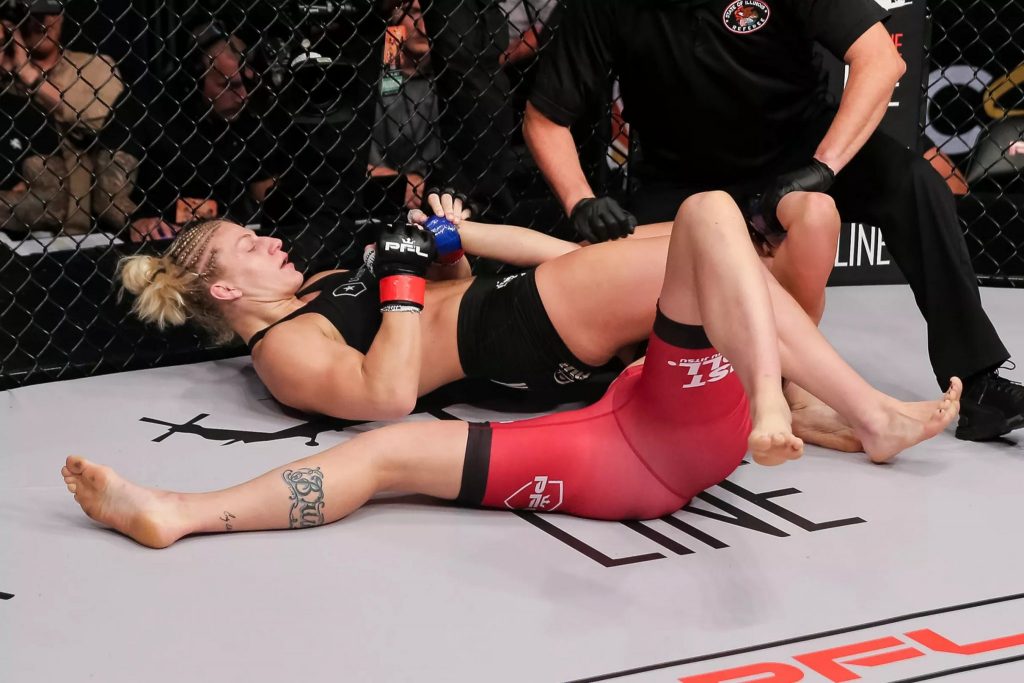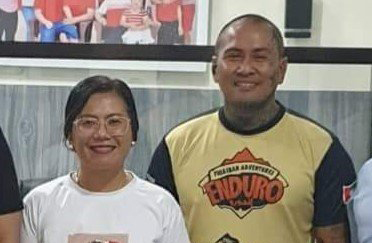
Take a cursory glance at Kayla Harrison and her accomplishments and it’s hard not to imagine the damage she could do at 145 pounds.
The first American to ever win a gold medal in judo at the Olympics, which she did in 2012. Then repeated in 2016. And now 2-0 in her professional MMA career. Harrison has been dominant in the Professional Fighters League so far, debuting with a first-round submission of Brittney Elkin in June and following that with a third-round TKO of Jozette Cotton last Thursday.
For now, however, Harrison is competing in the relatively bare women’s lightweight division, and while she’s trusting in the PFL matchmakers to continue to find opponents to test her at 155 pounds, she knows that talks of dropping a division will only grow as she continues to have success in the cage.
On Monday, Harrison told Luke Thomas on The MMA Hour that while she’s aware of the chatter, she’s in no hurry to change weight classes.
“First of all, I don’t believe in cutting weight,” Harrison said. “I think it’s terrible for your body, I think if you’re gonna win, you’re gonna win at whatever weight you compete at and I think it’s sending a bad message to young girls and young kids. I don’t want anyone, especially my niece or someone to think that to be thinner is to be better. I just don’t believe in that. You’re big, you’re strong, you’re powerful, that’s the message that I want to send.
“But I do realize that if I want to be considered the best in the world, I have to beat the best. And that person is at 145 pounds.”
Harrison, who estimates that she walks around at about 160 pounds, is referring to the woman has remained unbeaten since suffering her only loss 13 years ago, UFC women’s featherweight champion Cris Cyborg. Few have been able to offer much of a challenge to the 33-year-old Brazilian and Harrison’s impressive judo pedigree and physical gifts could position her as a potential rival for Cyborg somewhere down the road.
Cyborg herself was pressured for years to drop down to 135 pounds when current WWE star Ronda Rousey was on her own dominant run in the UFC, and twice competed at 140 pounds for the promotion. Both of those instances came with their own share of weight cut drama, something that Harrison has no interest in.
She explained that in judo tournaments, competitors weigh in the day before and then several random names are chosen to weigh in again the next day. If they’re more than five-percent heavier than the division they’re competing in, they are forced to withdraw.
“I think the judo idea is a really good idea, the random next day weight check,” Harrison said. “Maybe not five percent, seven percent or something like that. You have these guys cutting 40, 50, whatever, pounds, I can’t even fathom cutting 50 pounds and then believing that I can step into a cage at my very best 24 hours later.
“Never mind physically how I would feel, but you have to think about — you’re not swinging a baseball bat. People are punching you in the head. You’re dehydrated, you’re also dehydrating your brain. What’s the number one thing that keeps your brain safe? It’s the water. To me, I’m surprised that commissions allow it as of now. I’ve never had MRIs or blood tests and all that to do a judo tournament. They do all these tests as commissions to make sure you’re healthy and you can fight, but they’re going to let you cut 50 pounds? That doesn’t make any sense to me at all.”
Soon, Harrison may not have a choice in the matter. The PFL currently has six active male divisions, with Harrison’s lightweight bouts acting as more of a special attraction for now. Major promotions like the UFC, Bellator, and Invicta FC do not field a 155-pound roster for female fighters.
That means women’s featherweight could indeed be in Harrison’s future, a bridge that she plans to cross when the time comes for it.
“I think a lot of people have doubts about 155 because it’s such a big weight class,” Harrison said. “It’s very underdeveloped in the women’s MMA community, so if I have to go down to get some fights then I have to go down.”







